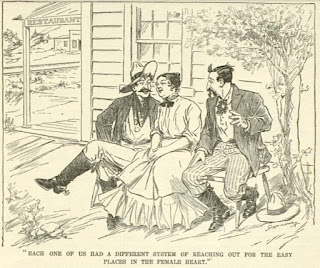Summary and analysis
BIOGRAPHY: click here
SUMMARY
Mr Slater is at home alone. Outside, it’s raining. He is out of work and has been waiting for the post man for some time. He’s expecting an important letter.
Then somebody knocks at the door, but it isn’t the
postman, because he knows his tread. Mr Slater doesn’t move at the knocking, but
the man outside insists. It turns out to be a salesman, Mr Audrey Bell. He was
looking for Mrs Slater, because he says she had won a prize. But there is no Mrs
Slater in the house. Later we learn that the “prize” is a free vacuuming of the
house.
Mr Bell comes into the house a little bit as if he was
invading it: Mr Slater doesn’t really invite him to come in, but, although he puts
up some resistance at the beginning, he soon seems a bit indifferent to the
intrusion. The salesman takes off his coat and his galoshes and starts to
assemble a contraption that turns out to be a vacuum cleaner. He behaves as if
he were at home, and even asks for an aspirin because he says he has a
headache.
Once the machine is ready, he goes to the next room
and starts to clean a mattress. It is an easy task because the blankets are on
the floor, as if nobody wanted to sleep on it anymore.
After that, Mr Bell goes to the sitting room and asks
for some dirt or a full ashtray. Mr Slater gives him a full ashtray and Mr Bell
empties its contents onto the carpet there; he wants to demonstrate how well the
machine works. All the while, the owner of the house has been watching the salesman’s
operations without complaining, but also keeping telling him he isn’t going to
buy anything.
While the salesman is doing his demonstration, the letter
Mr Slater was waiting for arrives. The postman has slid it inside through the
mail slot. But neither Mr Slater nor the Mr Bell go to pick it up.
When the salesman has finished his work, picks the
letter up, reads the recipient (that was Mr Slater), folds the letter, puts it
in his pocket, puts on his coat and galoshes, and goes away. Never Mr Slater
tries to get the letter; he only makes sure he was indeed the addressee. He doesn’t
buy the vacuum cleaner.
QUESTIONS
-I suppose you had paid attention that in the story
the dialogues are not marked (with quotations marks, for example). Why do you
think the author uses this stylistic device?
-In your view, why does the salesman mention some
important writers? What do you know about Auden, Rilke, Voltaire and Madame
Châtelet?
-Mr Bell pulled his lips? What can be the meaning of
this gesture? Do you remember some other curious gestures or grimaces?
-In your opinion, what is the relation between the
title and the story?
-The story is very simple, but it has to have a deeper
meaning: for you, what is its true meaning?
VOCABULARY
notices, railhead, corns, matted, churchly, scoop, tugged




